I need to start from the very beginning to summarize my problem:
I'm creating a structure with a react framework to build a simple reactive page. I guess I can define it as a single page application:
Here's the structure:
Right now my article-content.js file has the following code:
import $ from "jquery";
const rootURL = 'mytargetwebsite';
const config = {
rootURL: rootURL,
taskRoute: `${rootURL}/wp-json/wp/v2/posts`,
};
let articles = '';
let the_request = $.ajax({
type: 'GET',
url: config.taskRoute,
async: false,
});
the_request.done(function(data){
articles = data.map(data => (
{
name: data.title.rendered,
title: data.link,
excerpt: data.excerpt.rendered,
content: data.content.rendered
}
));
});
export default articles;
And it works fine but ideally, this is not how I want to run my app, because my goal is to use a promise or the fetch API to export the variable and reuse it in another file, which is the following:
ArticlesList.js:
import React from 'react';
import { Link } from 'react-router-dom';
const ArticlesList = ({ articles }) => (
<>
{articles.map((article, key) => (
<Link className="article-list-item" key={key} to={`/article/${article.name}`}>
<h3>{article.title}</h3>
<h3>{article.name}</h3>
{/*<div>{article.content}</div>*/}
<div
dangerouslySetInnerHTML={{
__html: article.content
}}></div>
</Link>
))}
</>
);
export default ArticlesList;
So, I tried to use the fetch API several times, but I'm not able to export it because, when I try to run the .map function on the ArticlesList.js page an error will be thrown.
Something like:
const ciao = async () => {
function fetchDemo() {
return fetch(config.taskRoute).then(function(response) {
return response.json();
}).then(function(json) {
let articles = json.map(data => (
{
name: data.title.rendered,
title: data.link,
content: data.content.rendered
}
));
return articles;
});
}
}
const articles = ciao();
console.log(articles);
will never work for some reason but, on the other hand, the idea will work, so the articles will log a promise that it is resolved and contains the data that I need to map or loop through that I need on the other page.
The approach with the promise is very similar and, like in the other case, will work:
const articles = new Promise((resolve,reject) => {
fetch(config.taskRoute, {
method: 'GET',
headers: { 'Content-Type': 'application/json', },
})
.then(response => response.json())
.then(data => {
resolve(data.map(data => ({
name: data.title.rendered,
title: data.link,
content: data.content.rendered
})));
})
.catch((error) => {
reject(error)
});
});
export default articles;
But still, I won't be able to export my variable because it will fail in the other file (ArticlesList.js).
I tried several other approaches but they all fail so far.
Any hint?
UPDATE:
There must be something that I can't know because in theory, my code works fine:
ArticlesList.js
import React from 'react';
import { Link } from 'react-router-dom';
import articles from "../pages/article-content";
articles.then(articles => {
console.log(articles);
return;
});
If I console.log articles, it contains the value that I need to map but as soon as I try to map them:
console.log(articles);//works!
const ArticlesList = ({ articles }) => (
<>
{articles.map((article, key) => (
<Link className="article-list-item" key={key} to={`/article/${article.name}`}>
<h3>{article.title}</h3>
<h3>{article.name}</h3>
{/*<div>{article.content}</div>*/}
<div
dangerouslySetInnerHTML={{
__html: article.content
}}></div>
</Link>
))}
</>
);//doesn't work
I will get a:
TypeError: articles.map is not a function
